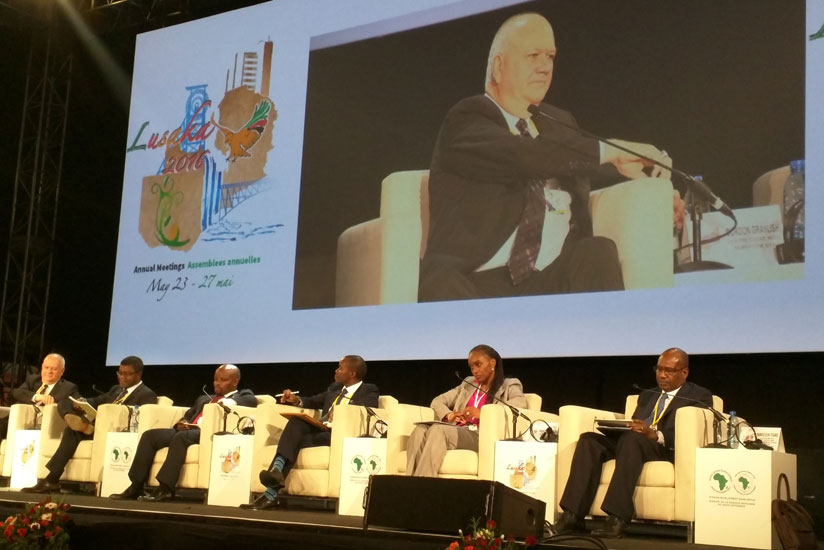On the first day of the ongoing 2016 African Development Bank (AfDB) Annual Meetings in the Zambian capital Lusaka, leaders have discussed how to harness the ICT-revolution to build a ‘Smart Africa’ and affordability of ICT technologies, it was heard, should be the focus of governments if benefits are to trickle down to ordinary Africans.


On the first day of the ongoing 2016 African Development Bank (AfDB) Annual Meetings in the Zambian capital Lusaka, leaders have discussed how to harness the ICT-revolution to build a ‘Smart Africa’ and affordability of ICT technologies, it was heard, should be the focus of governments if benefits are to trickle down to ordinary Africans.
There was no debate among high-level panelists as to whether investing in ICT should be a priority to African governments; instead, the Monday afternoon conversation was dominated by what should be done to ensure that the digital revolution is as inclusive as possible.
Panelists included Rwanda’s Minister for Youth and ICT Jean Philbert Nsengimana; Johnson Omobola, Chairperson for Affordable Internet; Joseph Mucheru, Kenya’s Cabinet Secretary in the Ministry of Information and Communications, Jean Philbert Nsengimana; Thierry Zomahoun, the Chief Executive Officer of the Institute of Mathematical Sciences; and Hamadoun Toure, the Executive Director of the Kigali based Smart Africa.
The room was not short of informed ideas and opinions as debate raged. "ICT is not an option for Africa. It is a must. The ICT revolution presents us the opportunity to leap-frog and make lives easier for our people,” said Kenya’s Mucheru.
His views were echoed by Rwanda’s Nsengimana, who noted that with the ICT-revolution, Africa cannot afford to play catch-up.
"We are talking about lives being saved and jobs being created here,” said the Rwandan minister.
Kenyan TV Journalist Wallace Kantai, who moderated the session, tasked panelists to explain why, if ICT was a must, African governments are not being seen to be doing enough to harness the ICT-revolution and its supposed benefits.
"Government taxes are killing ICT investments at birth. Investments need to be spared taxes at the point of investment, if benefits such as job creation are to be realised,” opined Nigeria’s Johnson Omobola, Chairperson for Affordable Internet.
Although it was generally agreed that ICT investments across Africa are being hampered by unfriendly tax regimes, Amb. Claver Gatete, Rwanda’s Minister for Finance and Economic Planning, who was following the debate from the audience, joined in to counter the charge.
"Rwanda is an exception on this. We actually don’t collect a single penny on IT imports because it is part of our long-term strategy to promote the sector,” he said, adding that it was incumbent upon governments to build enabling environments to harness the ICT-revolution.
Balancing priorities
While ICT received no opposition as an investment priority, an argument was made that African governments are under pressure from their own people to provide what they regard as more important services such as roads, medicine in hospitals, and building new classroom blocks.
"I am yet to hear of riots in a country over poor broadband connection. But there are grumbles over poor roads and healthcare,” remarked the session moderator.
However, members of the panel countered his aver arguing that investing in ICT has a positive trickledown effect on other sectors such as education, roads and hospitals in form of easing and expediting service delivery to citizens.
A good example was cited in Rwanda where, the Minister for ICT told the audience, that the government has recently launched the use of drones to deliver drugs to hospitals in response to emergency cases, especially in countryside facilities.
"If you think about it, mothers die every day while delivering not because there are no medicines but because they fail the get access to medicines on time,” he noted.
As for education, it was noted that ICT is an enabler which doesn’t only make teaching easier for teachers but also make learning fun for students.
Hamadoun Toure, noted that more investment in ICT is the surest way for improving connectivity among Africans, to ease communication and boost intra-Africa trade, hence serving the same purpose of a physical road.
In concluding perhaps one of the liveliest sessions on the opening day of AfDB Annual Meetings, the take-home message was for African countries to learn from each other and adopt best policy practices in addressing issues of affordability, widening accessibility and e-waste management.
For instance, joining the manufacturing chain, by way of locally assembling smart-devices such as laptops and making them available to locals inexpensively, was one of the recommendations that were fronted by the panelists; this, it was heard, is already being done in Rwanda.
Investing in technology research and innovation was the other recommendation emphasized by panelist Thierry Zomahoun, saying it is critical for governments to do if the dream of creating a ‘Smart-Africa’ is to be realised.
The 51st annual meetings of the AfDB are being held under the theme, ‘Energy and Climate Change.’
editorial@newtimes.co.rw


